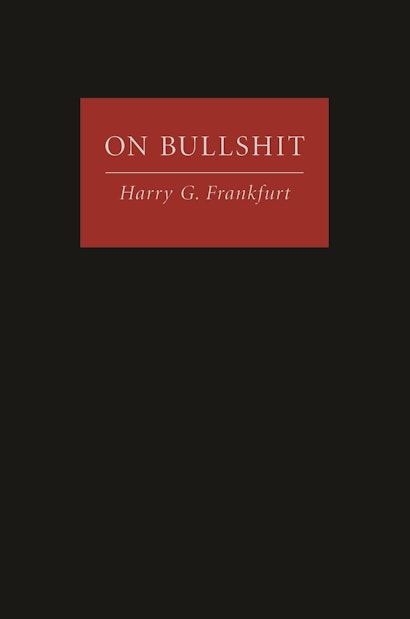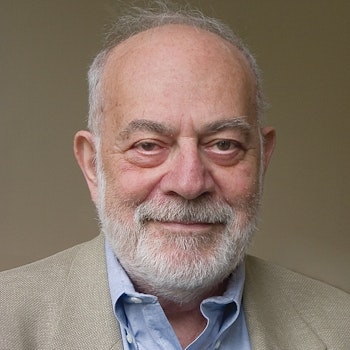One of the most prominent features of our world is that there is so much bullshit. Yet we have no clear understanding of what bullshit is, how it’s distinct from lying, what functions it serves, and what it means. In his acclaimed bestseller On Bullshit, Harry Frankfurt, who was one of the world’s most influential moral philosophers, explores this important subject, which has become a central problem of politics and our world.
With his characteristic combination of philosophical acuity, psychological insight, and wry humor, Frankfurt argues that bullshitters misrepresent themselves to their audience not as liars do, that is, by deliberately making false claims about what is true. Rather, bullshitters seek to convey a certain impression of themselves without being concerned about whether anything at all is true. They quietly change the rules governing their end of the conversation so that claims about truth and falsity are irrelevant. Although bullshit can take many innocent forms, excessive indulgence in it can eventually undermine the bullshitter’s capacity to tell the truth in a way that lying does not. Liars at least acknowledge that the truth matters. Because of this, bullshit is a greater enemy of the truth than lies are.
Remarkably prescient and insightful, On Bullshit is a small book that explains a great deal about our time.
Awards and Recognition
- A #1 New York Times Bestseller
- Harry G. Frankfurt, Charles Homer Haskins Prize Lecturer, American Council of Learned Societies
- Winner of the Bestseller Award in Philosophy, The Book Standard
"Brilliant."—Fareed Zakaria, Washington Post
"Seminal."—Roger Cohen, New York Times
"Immediately, I must say: read it. Beautifully written, lucid, ironic and profound, it is a model of what philosophy can and should do. It is a small and highly provocative masterpiece, and I really don't think I am bullshitting you here."—Bryan Appleyard, Sunday Times
"Frankfurt’s account of bullshit is doubly remarkable. Not only does he define it in a novel way that distinguishes it from lying; he also uses this definition to establish a powerful claim: ‘Bullshit is a greater enemy of truth than lies are.’"—Jim Holt, The New Yorker
"On Bullshit taxonomises an entire style of government."—Aditya Chakrabortty, The Guardian
"[On Bullshit] remains unnervingly relevant. . . . Frankfurt described the bullshitter as ‘he’ rather than ‘she’ or ‘they.' But now . . . we may have to refer to the bullshitter as ‘it’—because a new generation of chatbots are poised to generate bullshit on an undreamt-of scale."—Tim Harford, Financial Times
"A tightly focused, telling critique of a political and cultural climate that seems positively humid with mendacity, obfuscation, evasion and illusion."—Steven Winn, San Francisco Chronicle
"Frankfurt famously argued that bullshit is speech that is typically persuasive but is detached from a concern with the truth. Large language models are the ultimate bullshitters because they are designed to be plausible (and therefore convincing) with no regard for the truth. . . . And bullshit is dangerous, warned Frankfurt."—Carissa Véliz, Time
"The droll prose is a tasty treat."—Richard Pachter, Boston Globe
"[Frankfurt] tries, with the help of Wittgenstein, Pound, St. Augustine and the spy novelist Eric Ambler, among others, to ask some of the preliminary questions—to define the nature of a thing recognized by all but understood by none. . . . What is bullshit, after all? Mr. Frankfurt points out it is neither fish nor fowl. Those who produce it certainly aren't honest, but neither are they liars, given that the liar and the honest man are linked in their common, if not identical, regard for the truth."—Peter Edidin, New York Times
"A slim treatise on the pervasive, willful and devilish art of avoiding the truth."—Washington Post
"[Frankfurt] attracted public attention on a scale unimaginable to most academic philosophers. The reason for his appearances on Jon Stewart’s Daily Show, CBS’s 60 Minutes and other US network TV programmes was On Bullshit, his brief but bestselling disquisition on what he described as ‘one of the most salient features of our culture.'"—Financial Times
"The scholar who answers the question, 'What is bullshit?' bids boldly to define the spirit of the present age. . . . Frankfurt's definition is one of those not-at-all-obvious insights that become blindingly obvious the moment they are expressed."—Timothy Noah, Slate
"Harry Frankfurt is gone. But before he left, he won half the battle against bullshit: He called it what it is."—Stephen Harrop, Boston Globe
"Terrific. . . . Has anything truer ever been written?"—William Watson, Montreal Gazette
"This is what the world has long needed. . . . Bullshit is now such a dominant feature of our culture that most of us are confident we can recognize and rebuff it. But Frankfurt shows the reader just how insidious (and destructive) it can be. . . . This book will change your life."—Leopold Froehlich, Playboy
"Frankfurt is that rare thing, a secular thinker trained in analytical philosophy who has focused a lifetime’s attention on moral issues, has insights of real value, and is able to express them in rational language to any intelligent and attentive reader. . . . He is what an intellectual should be: someone who cares deeply about truth, and follows where it leads, instead of trying to lead it."—David Warren, Ottawa Citizen
"While philosophers have considered [On Bullshit] seriously, political scientists generally have not. But they should, because BS is an integral part of political rhetoric."—Paul Babbitt, Chronicle of Higher Education
"One of the most read works of public philosophy ever."—Nigel Warburton, New European
"Frankfurt's book should be required reading for anyone whose speech or writing are intended for public consumption. Despite his subject, he is definitely not full of it."—Kevin Wood, Japan Times
"On Bullshit grabbed the imagination of so many because it identified something that was obvious as soon as Frankfurt pointed it out. . . . Writing near the beginning of the digital age, Frankfurt never anticipated that the rivers of bullshit would soon become tsunamis, supercharged by the internet, social media and a 24/7 media cycle."—Brett Evans, Inside Story (Australia)
"Thanks to Harry G. Frankfurt, we now have the theoretical framework and tools for recognising and evaluating bullshit. On Bullshit is essential reading for the sceptically inclined."—Gerry Burke, Dublin Opinion
"One of the most read works of public philosophy ever."—Nigel Warburton, The New European
"Frankfurt's book should be required reading for anyone whose speech or writing are intended for public consumption. Despite his subject, he is definitely not full of it."—Kevin Wood, The Japan Times
"On Bullshit grabbed the imagination of so many because it identified something that was obvious as soon as Frankfurt pointed it out. . . . Writing near the beginning of the digital age, Frankfurt never anticipated that the rivers of bullshit would soon become tsunamis, supercharged by the internet, social media and a 24/7 media cycle."—Brett Evans, Inside Story (Australia)
"Thanks to Harry G. Frankfurt, we now have the theoretical framework and tools for recognising and evaluating bullshit. On Bullshit is essential reading for the sceptically inclined."—Gerry Burke, Dublin Opinion
"A gem of psychological insight, social commentary, philosophical analysis, and good humor. This is the work of an extraordinarily acute, attentive, and versatile philosopher who has succeeded in addressing an audience comprised of both other philosophers and the general public on a topic of considerable human interest in a characteristically wry and engaging way. It is one of the most enjoyable and humanly illuminating short pieces of philosophy produced in the past fifty years."—Raymond Geuss, University of Cambridge
"The most audacious of the ancient alchemists desired to transmute lead into gold. They never succeeded. Who would have known that they should have started not with a base metal, but with bullshit? Harry Frankfurt offers a philosophical analysis of bullshit that is golden. The prose by turns employs irony, broad humor, and tongue-in-cheek high seriousness while at the same time manages to have a rigorous logical coherence that is always impressive. One leaves the essay not merely thinking it was a delight. One leaves it realizing that one has engaged the accomplishment of a great analyst and thinker."—William Chester Jordan, Princeton University


